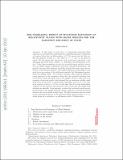| dc.contributor.author | Speck, Jared R. | |
| dc.date.accessioned | 2013-09-20T12:35:11Z | |
| dc.date.available | 2013-09-20T12:35:11Z | |
| dc.date.issued | 2013-07 | |
| dc.date.submitted | 2012-02 | |
| dc.identifier.issn | 0003-9527 | |
| dc.identifier.issn | 1432-0673 | |
| dc.identifier.uri | http://hdl.handle.net/1721.1/80818 | |
| dc.description | Author's final manuscript January 10, 2012 | en_US |
| dc.description.abstract | In this article, we study the 1 + 3-dimensional relativistic Euler equations on a pre-specified conformally flat expanding spacetime background with spatial slices that are diffeomorphic to R[superscript 3]. R 3 . We assume that the fluid verifies the equation of state p = c[2 over s]ρ, p = c s 2 ρ, where 0 ≤ c[subscript s] ≤ √1/3 0 ≤ c s ≤ 1/3 is the speed of sound. We also assume that the reciprocal of the scale factor associated with the expanding spacetime metric verifies a c[subscript s]−dependent time-integrability condition. Under these assumptions, we use the vector field energy method to prove that an explicit family of physically motivated, spatially homogeneous, and spatially isotropic fluid solutions are globally future-stable under small perturbations of their initial conditions. The explicit solutions corresponding to each scale factor are analogs of the well-known spatially flat Friedmann–Lemaitre–Robertson–Walker family. Our nonlinear analysis, which exploits dissipative terms generated by the expansion, shows that the perturbed solutions exist for all future times and remain close to the explicit solutions. This work is an extension of previous results, which showed that an analogous stability result holds when the spacetime is exponentially expanding. In the case of the radiation equation of state p = (1/3)ρ, we also show that if the time-integrability condition for the reciprocal of the scale factor fails to hold, then the explicit fluid solutions are unstable. More precisely, we show the existence of an open family of initial data such that (i) it contains arbitrarily small smooth perturbations of the explicit solutions’ data and (ii) the corresponding perturbed solutions necessarily form shocks in finite time. The shock formation proof is based on the conformal invariance of the relativistic Euler equations when c[2 over s] =1/3, c s 2 = 1/3, which allows for a reduction to a well-known result of Christodoulou. | en_US |
| dc.description.sponsorship | National Science Foundation (U.S.) (Grant DMS-1162211) | en_US |
| dc.description.sponsorship | Solomon Buchsbaum Research Fund | en_US |
| dc.description.sponsorship | National Science Foundation (U.S.). All-Institutes Postdoctoral Fellowship (Mathematical Sciences Research Institute (Berkeley, Calif.) Grant DMS-0441170) | en_US |
| dc.language.iso | en_US | |
| dc.publisher | Springer-Verlag | en_US |
| dc.relation.isversionof | http://dx.doi.org/10.1007/s00205-013-0655-3 | en_US |
| dc.rights | Creative Commons Attribution-Noncommercial-Share Alike 3.0 | en_US |
| dc.rights.uri | http://creativecommons.org/licenses/by-nc-sa/3.0/ | en_US |
| dc.source | arXiv | en_US |
| dc.title | The Stabilizing Effect of Spacetime Expansion on Relativistic Fluids With Sharp Results for the Radiation Equation of State | en_US |
| dc.type | Article | en_US |
| dc.identifier.citation | Speck, Jared. “The Stabilizing Effect of Spacetime Expansion on Relativistic Fluids With Sharp Results for the Radiation Equation of State.” Archive for Rational Mechanics and Analysis (July 30, 2013). | en_US |
| dc.contributor.department | Massachusetts Institute of Technology. Department of Mathematics | en_US |
| dc.contributor.mitauthor | Speck, Jared R. | en_US |
| dc.relation.journal | Archive for Rational Mechanics and Analysis | en_US |
| dc.eprint.version | Author's final manuscript | en_US |
| dc.type.uri | http://purl.org/eprint/type/JournalArticle | en_US |
| eprint.status | http://purl.org/eprint/status/PeerReviewed | en_US |
| dspace.orderedauthors | Speck, Jared | en_US |
| dc.identifier.orcid | https://orcid.org/0000-0001-5020-3568 | |
| mit.license | OPEN_ACCESS_POLICY | en_US |
| mit.metadata.status | Complete | |
